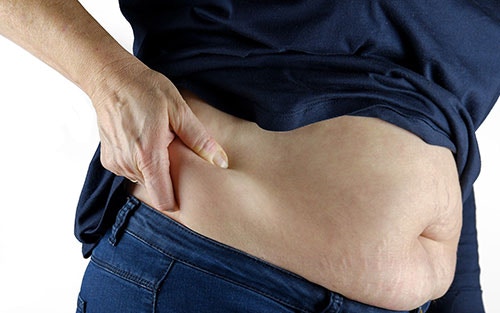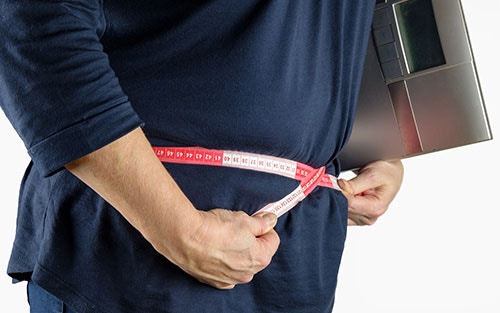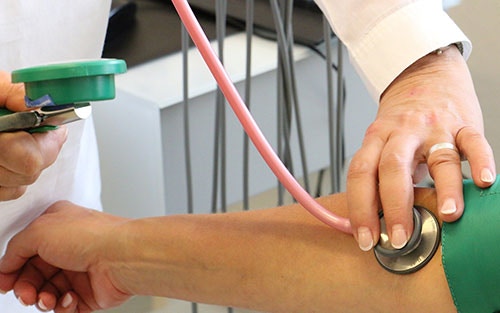Prevent your rising weight from severely harming your health. Knowing how carrying extra weight affects your health and wellness will help you take the necessary actions to keep it in check.

yourfootpalace.com gathered information on the side effects of being overweight, how to know when you are overweight, and how to lose weight.
Health Risks of Being Overweight
Unless you weigh yourself every day, you may not notice your weight gain until your clothing gets tighter or you physically struggle to get up after sleeping or sitting.
For some, weight gain is gradual, likely reflecting a poor lifestyle change. For others, weight gain is fast and may feel out-of-control, potentially reflecting a health or medical condition. For everyone, carrying too much weight puts you at risk (or increases the risk) of the following:
- High Blood Pressure
- High Cholesterol
- Type 2 Diabetes
- Coronary Heart Disease
- Fatty Liver Disease
- Stroke
- Sleep Apnea
- Breathing Problems
- Gallbladder Disease
- Osteoarthritis
- Mental Disorders (Depression, Anxiety, etc.)
- Some cancer types (Liver, Kidney, Pancreatic, Colorectal, Breast, Ovarian, Thyroid, etc.)
- Body Pain
- Pregnancy Complications
Perhaps most chilling is that being overweight or obese increases the risk factors in ALL causes of death.
Note: Excess weight and obesity increase the risk of developing severe illness from contracting COVID-19.
Watch this video from the Centers for Disease Control and Prevention about obesity.
Am I Overweight?
Almost everyone has asked this question at one time or another: Am I Overweight? The answer to this question may vary from person to person due to its contributing factors (height, sex, body fat, body shape, etc.). However, there are multiple ways to determine whether or not you are carrying too much weight. Consider the following measurement methods:
Body Mass Index (BMI) – This measurement determines whether you have an appropriate body weight by measuring your weight in relation to your height.
Formula: weight (lb) / [height (in)]2 x 703
Calculate your BMI by dividing your weight in pounds (lbs) by your height in inches (in) squared, then multiplying by 703.
Example: Weight = 250 lbs Height = 6’4″ (76″) Calculation: [250 ÷ (76)2] x 703 = 30.43 or (250 ÷ 5776) x 703 =30.43
According to the Centers for Disease Control and Prevention (CDC), BMI ranges for adults are as follows:
- Below 18.5 is considered underweight
- 18.5 – 24.9 is considered a normal or healthy weight
- 25.0 – 29.9 is considered overweight
- 30.0 and above is considered obese
You can also use the BMI calculator provided by the CDC at cdc.gov/healthyweight/assessing/bmi/adult_bmi/english_bmi_calculator/bmi_calculator.html
Note: BMI is a simple height/weight measurement that doesn’t account for waist or hip measurements, proportion of muscle mass, or proportion and/or distribution of fat.
Waist-to-Hip Ratio (WHR) – Another way to calculate whether you have a healthy weight and size is to calculate your waist-to-hip measurement. This calculation helps assess your risk for developing cardiovascular disease (CVD). Do this by:
- Measuring around your waist (just above your belly button)
- Measuring around your hips (at their widest point)
- Divide your waist measurement by your hip measurement

For example: If your waist is 42” and your hips are 39”, you will divide 42 by 39 to get 1.08.
Assess your risk factor for developing CVD as follows:
For adult males
- Below 0.9 – is considered low-risk
- 0.9 – 0.99 – is considered moderate risk
- 1.0 or above – is considered high risk
For adult females
- Below 0.8 – is considered low-risk
- 0.8 – 0.89 – is considered moderate risk
- 0.9 or above – is considered high risk
A study published in the Western Journal of Medicine concluded in part that a person’s waist-to-hip ratio foretells more about their cardiac status than measures of height and weight and lend further support to including WHR as part of the general physical examination.
Watch this video comparing BMI to WHR.
How To Lose Weight
There are pills, diets, online gimmicks, advertising, personal trainers, nutritionists, and various fitness gurus that all seem to hold the miraculous secret to your weight loss. One of the many problems with the promise of fast weight loss is keeping it off.
Let’s take an honest look at how you can lose weight and remove yourself from overweight and obese risk categories:
Consult Your Primary Care Physician (PCP) – Before beginning any diet or weight loss program, you should consult your primary care physician to rule out any:
- Unknown food allergies
- Underlying causes/factors contributing to weight gain
- Chemical or physical imbalances preventing weight loss
- Hereditary issues or complications
Besides ruling out potential complications, you also establish baselines for your improvement markers like blood pressure, cholesterol, BMI, etc.
Through regular visits to your PCP, you can monitor your:
- Weight gain/loss
- Blood pressure
- Cholesterol levels (LDL and HDL)
- BMI
- WHR

Tip: Your PCP can recommend a weight training program to safely increase your physical activity and refer you to a licensed nutritionist to clean up your diet.
Understanding The Components of a Healthy Weight Loss Program – Once you have consulted your PCP and eliminated any potential risks, your next conversation should be about what your weight loss program will consist of. Consider the following:
- A realistic weight loss goal
- A reduced-calorie, nutritionally-balanced meal plan
- Regular physical activity and/or exercise schedule
- A plan including behavioral changes to help you reach your goals and sustain your weight loss
- Persistence
Most diets eventually fail because they are not sustainable. By tailoring your current activities and habits, you are more likely to stick with the program for the long haul.
Behavior Changes for Successful Weight Loss – Ideally, you want to develop lifestyle habits that help you maintain a healthy weight range. Short-term “diets” that you “hop on” and then “fall off” are not the answer to long-term or successful weight management. These behaviors include:
- Making time for regular physical activity
- Reducing calorie and fat consumption
- Focusing on nutritional value vs. craving satisfaction
- Eating meals at regular times, including breakfast
- Weighing yourself regularly
- Rewarding yourself when accomplishing small and large milestones
- Not allowing small “slips” to result in large weight regain
Watch this video about weight loss through Behavior change.
Note: Rewarding yourself for your accomplishments doesn’t mean going out for pizza. Consider the following activities:
- Schedule a spa day
- Get a massage
- Take the family/friends bowling
- Go to the zoo or amusement park
Whatever you do to encourage yourself through your weight loss journey should include elements that contribute to your health and well being.
Weight Problems and Obesity
In this article, you discovered potential side effects of elevated weight and obesity, how to know when your weight is a problem, and how to lose weight.
By acknowledging that you have a weight problem, you can take action to responsibly remove yourself from high-risk categories.
Ignoring your weight gain can lead to organ disease, multiple forms of cancer, and rapidly contribute to factors potentially leaving you hospitalized or worse.
Sources:
ncbi.nlm.nih.gov/pmc/articles/PMC1071369/
nhlbi.nih.gov/health/educational/lose_wt/behavior.htm
cdc.gov/healthyweight/effects/index.html
nutrition.gov/topics/healthy-living-and-weight/strategies-success/interested-losing-weight
health.gov/myhealthfinder/topics/health-conditions/diabetes/losing-weight-conversation-starters
(706) 521-5290
(678) 963-5958